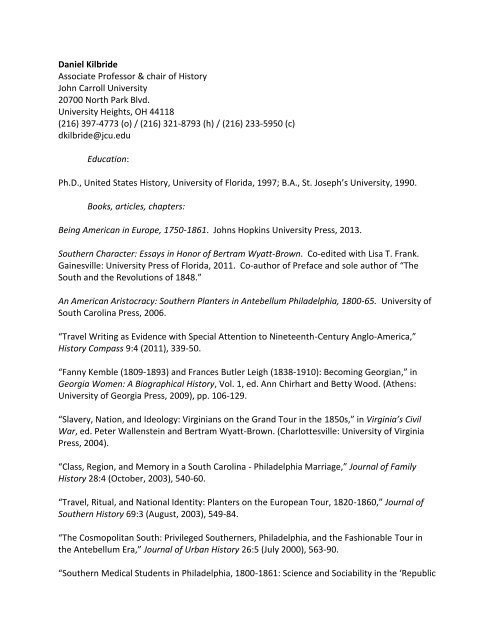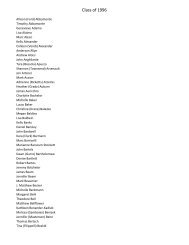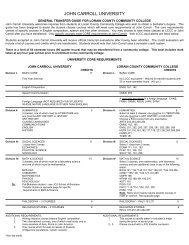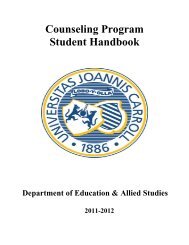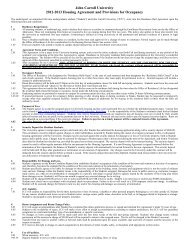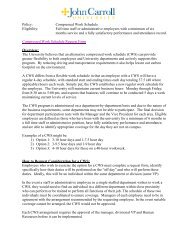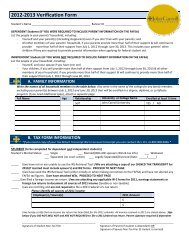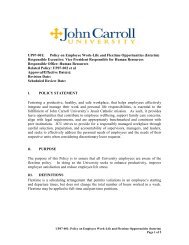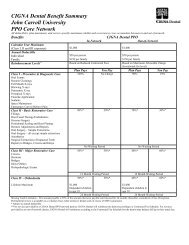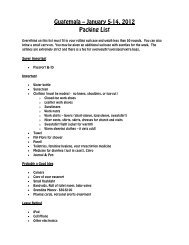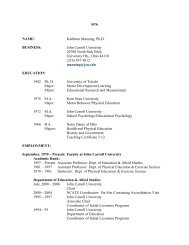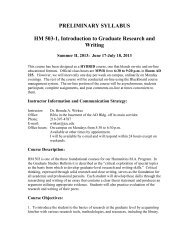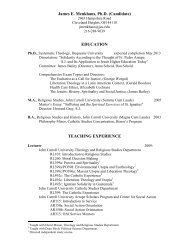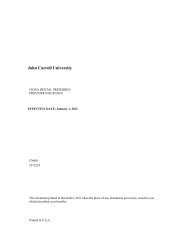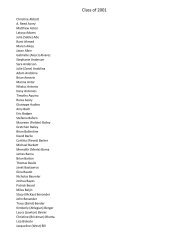Daniel Kilbride - John Carroll University
Daniel Kilbride - John Carroll University
Daniel Kilbride - John Carroll University
- No tags were found...
Create successful ePaper yourself
Turn your PDF publications into a flip-book with our unique Google optimized e-Paper software.
<strong>Daniel</strong> <strong>Kilbride</strong>Associate Professor & chair of History<strong>John</strong> <strong>Carroll</strong> <strong>University</strong>20700 North Park Blvd.<strong>University</strong> Heights, OH 44118(216) 397-4773 (o) / (216) 321-8793 (h) / (216) 233-5950 (c)dkilbride@jcu.eduEducation:Ph.D., United States History, <strong>University</strong> of Florida, 1997; B.A., St. Joseph’s <strong>University</strong>, 1990.Books, articles, chapters:Being American in Europe, 1750-1861. <strong>John</strong>s Hopkins <strong>University</strong> Press, 2013.Southern Character: Essays in Honor of Bertram Wyatt-Brown. Co-edited with Lisa T. Frank.Gainesville: <strong>University</strong> Press of Florida, 2011. Co-author of Preface and sole author of “TheSouth and the Revolutions of 1848.”An American Aristocracy: Southern Planters in Antebellum Philadelphia, 1800-65. <strong>University</strong> ofSouth Carolina Press, 2006.“Travel Writing as Evidence with Special Attention to Nineteenth-Century Anglo-America,”History Compass 9:4 (2011), 339-50.“Fanny Kemble (1809-1893) and Frances Butler Leigh (1838-1910): Becoming Georgian,” inGeorgia Women: A Biographical History, Vol. 1, ed. Ann Chirhart and Betty Wood. (Athens:<strong>University</strong> of Georgia Press, 2009), pp. 106-129.“Slavery, Nation, and Ideology: Virginians on the Grand Tour in the 1850s,” in Virginia’s CivilWar, ed. Peter Wallenstein and Bertram Wyatt-Brown. (Charlottesville: <strong>University</strong> of VirginiaPress, 2004).“Class, Region, and Memory in a South Carolina - Philadelphia Marriage,” Journal of FamilyHistory 28:4 (October, 2003), 540-60.“Travel, Ritual, and National Identity: Planters on the European Tour, 1820-1860,” Journal ofSouthern History 69:3 (August, 2003), 549-84.“The Cosmopolitan South: Privileged Southerners, Philadelphia, and the Fashionable Tour inthe Antebellum Era,” Journal of Urban History 26:5 (July 2000), 563-90.“Southern Medical Students in Philadelphia, 1800-1861: Science and Sociability in the ‘Republic
<strong>Kilbride</strong>, c.v.2of Medicine,’” Journal of Southern History 65:4 (November 1999), 697-732.“Cultivation, Conservatism, and the Early National Gentry: The Manigault Family and theirCircle,” Journal of the Early Republic 19:2 (Summer 1999), 221-256.“Slavery and Utilitarianism: Thomas Cooper and the Mind of the Old South,” Journal ofSouthern History 59 (August 1993): 469-486.Book Reviews:Antislavery and Abolition in Philadelphia: Emancipation and the Long Struggle for Racial Justicein the City of Brotherly Love, edited by Richard Newman and James Mueller. (Baton Rouge:Louisiana State <strong>University</strong> Press, 2011), Journal of American History 99 (2012): 297-298The Family Legacy of Henry Clay: In the Shadow of a Kentucky Patriarch, by Lindsey Apple.(Lexington: The <strong>University</strong> Press of Kentucky, 2011), in Ohio Valley History 12:1 (Spring 2012):98-100.Remaking Custom: Law and Identity in the Early American Republic, by Ellen Holmes Pearson.(Charlottesville: <strong>University</strong> of Virginia Press, 2011), in the Journal of the Early Republic 32 (fall2012), 541-44.Distant Revolutions: 1848 and the Challenge to American Exceptionalism, by Timothy MasonRoberts. (Charlottesville: <strong>University</strong> of Virginia Press, 2009), H-Diplo Roundable Reviews, Feb. 2,2011, http://www.h-net.org/~diplo/roundtables/PDF/Roundtable-XII-3.pdf.Gentlemen Merchants: A Charleston Family’s Odyssey, 1828-1870, edited by Philip N. Racine(Knoxville: <strong>University</strong> of Tennessee Press, 2008), Georgia Historical Quarterly 94 (Spring 2010),100-103.Gentlewomen and Learned Ladies: Women and Elite Formation in Eighteenth-CenturyPhiladelphia, by Sarah Fatherly (Bethlehem: Lehigh <strong>University</strong> Press, 2008), Journal of AmericanHistory 96 (Dec. 2009): 825-26.Slavery in White and Black: Class and Race in the Southern Slaveholders’ New World Order, byElizabeth Fox-Genovese and Eugene D. Genovese (Cambridge: Cambridge <strong>University</strong> Press,2008), American Historical Review (Dec. 2009): 1444-45.The Kentucky Tragedy: A Story of Conflict and Change in Antebellum America, by Dickson D.Bruce, Jr.. (Baton Rouge: Louisiana State <strong>University</strong> Press, 2006), Ohio Valley History 8 (Winter2008): 76-78.
Anglophilia: Deference, Devotion, and Antebellum America, by Elisa Tamarkin. (Chicago:<strong>University</strong> of Chicago Press, 2008, H-Atlantic, October 2008, http://www.hnet.org/reviews/showpdf.php?id=22807<strong>Kilbride</strong>, c.v.3Crafting the Overseer's Image, by William E. Wiethoff. (Columbia: <strong>University</strong> of South CarolinaPress. 2006), in American Historical Review 113 (2008), 504–505.New York Burning: Liberty, Slavery, and Conspiracy in Eighteenth-Century Manhattan, by JillLepore. (New York: Alfred A. Knopf, 2005), in Pennsylvania History 73 (Spring 2006), 263-66.Communities of Kinship: Antebellum Families and the Settlement of the Cotton Frontier, byCaroline Earle Billingsley. (Athens: <strong>University</strong> of Georgia Press, 2004), Florida HistoricalQuarterly 83 (2005), 147-49.Halls of Honor: College Men in the Old South, by Robert F. Pace. (Baton Rouge: Louisiana State<strong>University</strong> Press, 2004), Journal of Southern History 71:4 (Nov. 2005), 886-87.Review Essay: Conjectures of Order: Intellectual Life and the American South, 1810-1860, byMichael O’Brien. 2 vols. (Chapel Hill: <strong>University</strong> of North Carolina Press, 2004), GeorgiaHistorical Quarterly 89:3 (fall 2005), 389-401.The Origins of the Southern Middle Class, 1800-1861, by Jonathan D. Wells. (Chapel Hill:<strong>University</strong> of North Carolina Press, 2004), Journal of the Early Republic 25:2 (summer 2005),327-30.Masters of the Big House: Elite Slaveholders of the Mid-Nineteenth Century, by WilliamKaufmann Scarborough. (Baton Rouge: Louisiana State <strong>University</strong> Press, 2003), AlabamaReview 58:1 (January, 2005), 63-65.The Roman Years of a South Carolina Artist: Caroline Carson’s Letters Home, 1872-1892, editedwith an introduction by William H. Pease and Jane H. Pease. Women’s Diaries and Letters ofthe South. (Columbia: <strong>University</strong> of South Carolina Press, 2003), Journal of Southern History70:4 (November, 2004), 943-44.Like a Sponge Thrown into Water: Francis Lieber’s European Travel Journal of 1844-1845 editedby Charles R. Mack and Ilona S. Mack. (Columbia: <strong>University</strong> of South Carolina Press, 2002),Journal of Southern History 69:4 (November, 2003), 901-02.Democratic Dissent and the Cultural Fictions of Antebellum America, by Steven Josh Hartnett(Urbana: <strong>University</strong> of Illinois Press, 2002), Journal of Southern History 69:4 (November, 2003),912-13.
<strong>Kilbride</strong>, c.v.4Drinking the Waters: Creating an American Leisure Class at Nineteenth-Century Mineral Springs,by Thomas Chambers. (Washington: Smithsonian Institution Press, 2002), Virginia Magazine ofHistory and Biography 103:1 (2003), 82-83.A Lady of the High Hills: Natalie Delage Sumter, by Thomas Tisdale. (Columbia: <strong>University</strong> ofSouth Carolina Press, 2001), Journal of the Early Republic 23:1 (spring, 2003), 128-29.Between North and South: The Letters of Emily Wharton Sinkler, 1842-1865, edited by AnneSinkler Whaley LeClercq. Women’s Diaries and Letters of the South. (Columbia: <strong>University</strong> ofSouth Carolina Press, 2001), Journal of the Early Republic 22:4 (winter 2002), 716-79.Creating an Old South: Middle Florida’s Plantation Frontier before the Civil War, by Edward E.Baptist (Chapel Hill: <strong>University</strong> of North Carolina Press, 2002), for H-South, posted January 16,2003.Ladies and Gentlemen on Display: Planter Society at the Virginia Springs, 1790-1860, byCharlene M. Boyer Lewis (Charlottesville: <strong>University</strong> Press of Virginia, 2002), in the GeorgiaHistorical Quarterly 86:3 (Fall 2002), 298-99.Best Companions: Letters of Eliza Middleton Fisher and Her Mother, Mary Hering Middleton,from Charleston, Philadelphia, and Newport, 1839-1846, edited by Eliza Cope Harrison.Women’s Diaries and Letters of the South. (Columbia: <strong>University</strong> of South Carolina Press, 2001),in the Journal of the Early Republic 21:4 (Winter, 2001), 726-29.Review Essay: Return Passages: Great American Travel Writing, 1780-1910, by Larzer Ziff (NewHaven: Yale <strong>University</strong> Press, 2000), and The Paris Years of Thomas Jefferson, by WilliamHoward Adams (New Haven: Yale <strong>University</strong> Press, 1997), in Pennsylvania History 69:1 (Winter,2002), 94-98.All Our Relations: Blood Ties and Emotional Bonds among the Early South Carolina Gentry, byLorri Glover. (Baltimore: <strong>John</strong>s Hopkins <strong>University</strong> Press, 2000), in the South Carolina HistoricalMagazine 102:4 (October, 2001), 362-64.Science, Race, and Religion in the American South: <strong>John</strong> Bachman and the Charleston Circle ofNaturalists, 1815-1895, by Lester D. Stephens. (Chapel Hill: <strong>University</strong> of North Carolina Press,2000), in the South Carolina Historical Magazine 102:2 (April 2001): 169-171.Stories with a Moral: Literature and Society in Nineteenth-Century Georgia, by Michael E. Price.(Athens, Ga.: <strong>University</strong> of Georgia Press, 2000), for H-South, February 13, 2001.The Persistence of Empire: British Political Culture in the Age of the American Revolution, byEliga H. Gould. (Chapel Hill: <strong>University</strong> of North Carolina Press for the Omohundro Institute of
<strong>Kilbride</strong>, c.v.5Early American History and Culture, 2000), in Pennsylvania History, 67:2 (Autumn 2000): 561-63.The Leverett Letters: Correspondence of a South Carolina Family, 1851-1868, edited by FrancesWallace Taylor, et al. (Columbia: <strong>University</strong> of South Carolina Press, 2000), for the GeorgiaHistorical Quarterly 84:3 (Fall 2000), 521-523.Methodism and the Southern Mind, 1770-1810, by Cynthia Lynn Lyerly. Religion in AmericaSeries (New York: Oxford <strong>University</strong> Press, 1998), in the Journal of the Early Republic 19:2(Summer 1999), 321-324.The Promise of the New South: Life after Reconstruction, by Edward L. Ayers (New York: Oxford<strong>University</strong> Press, 1992), in The Southern Historian 15 (Spring 1994): 90-92.The Education of the Southern Belle: Higher Education and Student Socialization in theAntebellum South, by Christie Anne Farnham (New York: New York <strong>University</strong> Press, 1994), inthe Florida Historical Quarterly (April 1995), 511-513.Encyclopedia Articles:“Travelers and Travel,” for The Encyclopedia of World Trade since 1450, <strong>John</strong> J. McCusker,editor-in-chief. (New York: Macmillan Reference USA, 2006).“Americans Abroad” and “1848 Revolutions,” for American History through Literature, 1820-1870, ed. Janet Gabler-Hover and Robert D. Sattelmeyer, pp. 31-35; 979-984 (Detroit.: CharlesScribner’s Sons, 2006).Conference Papers:“Americans Abroad and the Creation of the ‘Egalitarian Myth:’ A Reconsideration,” Society forHistorians of the Early American Republic, St. Louis, Missouri, July 2013.“The Material Culture of Colonial Travelers in Europe, 1750-1776,” Society of EarlyAmericanists, Savannah, Georgia, February 28, 2013.“Confronting Catholicism: American Travelers and the Evolution of Anti-Popery, 1750-1820,”Omohundro Institute of Early American History and Culture, Baltimore, Maryland, June2013 (proposed).“The Dilemma of Anti-Catholicism in American Travel Writing, circa 1790-1830,” Society forHistorians of the Early American Republic, Phila., Pa., July 15, 2011.
“The Ambivalent Anglophobia of American Travelers in Europe, 1783-1820,” Society forHistorians of the Early American Republic, Rochester, New York, July 25, 2010.Chair, “Middle-Class Identity and Social Mobility in the Antebellum South,” Society forHistorians of the Early American Republic, Louisville, Kentucky, July 19, 2009.<strong>Kilbride</strong>, c.v.6“Racism and American Encounters with European Catholicism in the Mid-19 th Century,” Societyfor Historians of American Foreign Relations, Falls Church, Virginia, June 27, 2009.“European Travel as Cultural Criticism in the Early 19 th Century,” Society for Historians of theEarly American Republic, Philadelphia, July 17, 2008.“Beyond Capitalism and Feudalism: Planter-Class Southerners in Atlantic Perspective,”Southern Historical Association, Birmingham, Ala., November 2006.“Race, Conservatism, and Responses to the Revolutions of 1848 in the United States South,”Society for Historians of the Early American Republic, Montreal, Quebec, July 22, 2006.“Race, National Characters, and American Responses to European Revolutions, 1789-1848.”International Seminar on the History of the Atlantic World, Harvard <strong>University</strong>, August 12,2005.“Race, Radicalism, and National Identity: Black and White Abolitionists in Europe before theCivil War,” Mid-America History Conference, Memphis, Tenn., September 19, 2003.“American Women Travelers to France in the Early Republic,” Society for Historians of the EarlyAmerican Republic, July 17, 2003, Ohio State <strong>University</strong>.“From Provincial to National Identity: American Leisure Travelers to Europe, circa 1700-1820,”International Seminar on the History of the Atlantic World, Harvard <strong>University</strong>, August 6, 2002.“American Travelers to Scotland, 1750-1850,” British Association of American StudiesConference, April 6, 2002, Oxford, UK.“Slavery, Nation, and Ideology: Virginians on the Grand Tour in the 1850s,” Douglas SouthallFreeman and Southern Intellectual History conference, February 22, 2002, Richmond, Va.“Of Courts, Salons, and Ruins: The Ritual Behavior of Southern Travelers in Europe, 1800-1865,” Southern Historical Association, November 19, 2001, New Orleans, Louisiana.“Britons, Cosmopolites, Americans: American Grand Tourists in the Eighteenth Century,”Omohundro Institute of Early American History and Culture, Glasgow, Scotland, July 12, 2001.
<strong>Kilbride</strong>, c.v.7“Privileged Southerners, the Grand Tour, and the Roots of Regional Identity before the CivilWar,” Global Currents in Southern History, from European Colonization to the Late-20thCentury, Georgia Southern <strong>University</strong>, Statesboro, Georgia, October 21, 2000.“Avoiding a ‘little, mean, [and] despicable’ Republic: Privileged Women and the Cultural Workof the Grand Tour in the Post-Revolutionary Era,” Society for Historians of the Early AmericanRepublic, Buffalo, New York, July 21, 2000.“Civility and Civil War: Sectional Conflict and Social Memory in the Fisher-Middleton Family,”American Historical Association, January 8, 2000.“The Fashionable Tour: Gentility, Sociability, and Nationalism in the Planter Class,” SouthernHistorical Association, November 13, 1998.“‘Our society of old gentlemen:’ Conservatism and Companionship within a Philadelphia-Carolina Widows’ Circle,” Southern Association of Women Historians Conference, Charleston,South Carolina, June 13, 1997.“‘Your appropriate sphere as a lady:’ Upper-Class Women and the Public Sphere in AntebellumAmerica,” Philadelphia Center for Early American Studies Seminar, Philadelphia, Pennsylvania,November 3, 1995.“‘You can’t guess in what estimation southerners are held here:’ Planter Daughters,Philadelphia Ladies’ Academies, and Class Identity in Antebellum America,” Society forHistorians of the Early American Republic, Cincinnati, Ohio, July 20, 1995.Comment for the panel “The Modern South and Social Memory” at Telling About the South: AStudent Conference on Social Memory and Southern History, Charlottesville, Virginia, March19, 1994.“Natchez and Philadelphia: The Web of Kinship, Culture, and Commerce in AntebellumAmerica,” First Biennial Historic Natchez Conference, Natchez, Mississippi, January 21, 1994.Professional employment:Chair of History department, <strong>John</strong> <strong>Carroll</strong>, 2009-presentAssociate Professor of History, <strong>John</strong> <strong>Carroll</strong>, 2002-presentAssistant Professor of History, <strong>John</strong> <strong>Carroll</strong> <strong>University</strong>, 1997-2002Adjunct Instructor, Department of History, Hollins College, Roanoke, Virginia, 1996-1997Adjunct Instructor, Social Science Division, Virginia Western Community College, Roanoke,Virginia, 1996-1997.
<strong>Kilbride</strong>, c.v.8Courses taught:Abraham Lincoln; African-American history; American Intellectual History; Antebellum UnitedStates; The Atlantic World; Civil War Era; Early American Culture; First Year Seminar; HistoricalMethods; The Old South; Senior Seminar; Social Justice in Early America; The United States andthe World; United States history to 1877; United States history, 1877-present.Honors and Awards:2009 Participant, Slave Narratives Seminar, Yale <strong>University</strong>, June 7-10, 20092007 Peterson Fellow, American Antiquarian Society, Worcester, Mass.2001-02 Andrew W. Mellon Fellow, Library Company of Philadelphia/Historical Society ofPennsylvaniaAndrew W. Mellon Fellow, Virginia Historical Society2001 Grauel Faculty Fellowship, <strong>John</strong> <strong>Carroll</strong> <strong>University</strong> (sabbatical, fall 2001)2000 Summer Research Fellowship, <strong>John</strong> <strong>Carroll</strong> <strong>University</strong>1999 Summer Research Fellowship, <strong>John</strong> <strong>Carroll</strong> <strong>University</strong>1998 Summer Ethics Course Development Fellowship, <strong>John</strong> <strong>Carroll</strong> <strong>University</strong>1998 Attended “Roots: The African Background of American Culture Through theTrans-Atlantic Slave Trade,” a National Endowment for the Humanities SummerInstitute, Charlottesville, Virginia.1996 Linda Vance Award in Women’s History, Department of History, <strong>University</strong> ofFlorida.Richard J. Milbaur Dissertation Fellowship, Department of History, <strong>University</strong> ofFlorida1995-1996 Andrew W. Mellon Fellowship, Virginia Historical Society1995 McGinty Fellowship, College of Liberal Arts and Sciences, <strong>University</strong> of Florida1994-1995 Research Fellow, Philadelphia Center for Early American StudiesRichard J. Milbaur Dissertation Fellowship, Department of History, <strong>University</strong> ofFloridaJack and Celia Proctor Scholarship Award, Department of History, <strong>University</strong> ofFloridaAndrew W. Mellon Fellowship, Library Company of Philadelphia.Professional Activities:Member: Society for Historians of the Early American Republic; Organization of AmericanHistorians; American Historical Association; Southern Historical Association.Membership Committee, Southern Historical Association (1999-2003); Manuscript Referee,Journal of Southern History, Journal of American History, Journal of the Early Republic, OhioValley History, Pennsylvania History.


